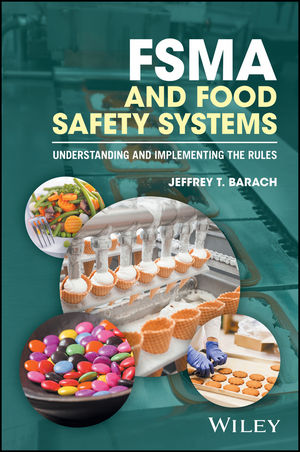FSMA Training: HACCP Isn’t Enough

As the Food Safety Modernization Act (FSMA) deadlines pass or quickly approach, companies subject to FSMA must create and implement a food safety Plan (also referred to as Hazard Analysis and Risk-Based Preventive Controls or HARPC). The U.S. Food and Drug Administration (FDA)’s final rules implementing new preventive controls for human and animal food requires the creation and implementation of a food safety plan for each individual facility. A food safety plan must be created and overseen by a preventive controls-qualified individual (PCQI) as defined by FSMA. In order to qualify, a PCQI should be an already existing employee, third-party consultant or committee of individuals who have completed training under an FDA-approved curriculum or have the equivalent on-the-job experience. FDA, through the Food Safety Preventive Controls Alliance (FSPCA), has recently approved a standardized curriculum for training PCQIs. This leaves companies with the question following question: If my company is already HACCP (Hazard Analysis and Critical Control Points) compliant, do we need the FDA-approved training? Discussed below is a brief overview of the requirements for a food safety plan , a PCQI and the difference between HARPC and HACCP.
One of the key requirements in the new preventive controls for human and animal foods is that facilities must create and implement a food safety plan that reflects the new focus on HARPC. The plan must contain a written Hazard Analysis, identifying known or reasonably foreseeable biological, chemical and physical hazards; written preventive controls including process controls, food allergen controls and sanitation controls; written supply chain controls; a written recall plan; written procedures for monitoring the implementation of the preventive controls; written corrective action procedures; and written verification procedures. Each facility site must have its own food safety plan specifically designed for that facility to prevent or minimize the identified hazards. In order to ensure effective compliance to this new standard, FDA requires the food safety plan be created and implemented by a PCQI.
In early proposed drafts of the rule, FDA required a qualified individual to create and implement a food safety plan. Due to the pervasiveness of the term “qualified individual” throughout all of the proposed FSMA rules, each with different qualification requirements, FDA changed the language to PCQI. The new language was used to distinguish someone qualified to create and implement the preventive controls key to the new food safety plan versus others who were considered qualified individuals with less or different training for other FSMA rules.
According to the rule, a PCQI is defined as “a person who has successfully completed training in the development and application of risk-based preventive controls at least equivalent to that received under a standardized curriculum recognized as adequate by the FDA or is otherwise qualified through job experience to develop and apply a food safety system.” A PCQI can be an employee or can be an outside third party. But without training in the approved curriculum, how does one know whether their PCQI is equally qualified through on the job training?
Many companies and third-party safety consultants make the mistake of assuming that HACCP training or HACCP compliance will meet these new FSMA requirements. HACCP compliance and FSMA compliance are similar but have important differences—differences that can’t necessarily be understood without PCQI training. At a fundamental level, HACCP focuses on preventing post-process contamination, whereas the FSMA food safety plan takes a more preventive focus, identifying potential risks and implementing appropriate controls to proactively prevent contamination. The food safety plan focuses on science or risk-based preventive controls, whereas HACCP focuses on CCPs. The food safety plan focuses on known hazards that could “reasonably occur.” Hazards to consider under the food safety plan may exist because they are inherent to the raw material or product, because they occur through error during the process or because they are caused deliberately. The risk-based analysis must look backward to the risk that may come with raw materials or ingredients. It also must look forward to risks that might arise after a product leaves the facility.
What are the consequences of creating an inadequate food safety plan by someone not qualified? FDA can take action, ranging from a warning letter to bringing criminal charges and suspending the food facility’s registration. Additionally, if contaminated food comes from a facility without an adequate food safety plan created by a PCQI, harmed individuals may have a stronger liability claim based on negligence. Noncompliance with a federal regulation could be seen as a violation of a company’s standard of care in a court of law and could mean even bigger damage payouts.
Utilizing someone trained as a PCQI is critical, whether using someone internally or hiring a consultant. Relying on “equivalent on the job experience” or HACCP training is a risk not worth taking. Creating a food safety plan that is FSMA compliant rather than HACCP compliant is mandatory. The good news is that FDA has now approved a curriculum for PCQIs. Currently, FSPCA is offering nationwide training. For more information on available course locations, dates, instructors or pricing, please visit www.ifsh.iit.edu/fspca. Three days of training is more than worth the risk of noncompliance.
Kathy Hardee, Esq., is co-chair of the Food & Agriculture Industry Group at Polsinelli, PC, which is composed of a team of attorneys from every legal practice area and who each have a focused background in the food industry.
Gabrielle Ilaria, Esq., is a Toxic and Mass Tort associate at Polsinelli, PC.
Looking for a reprint of this article?
From high-res PDFs to custom plaques, order your copy today!








